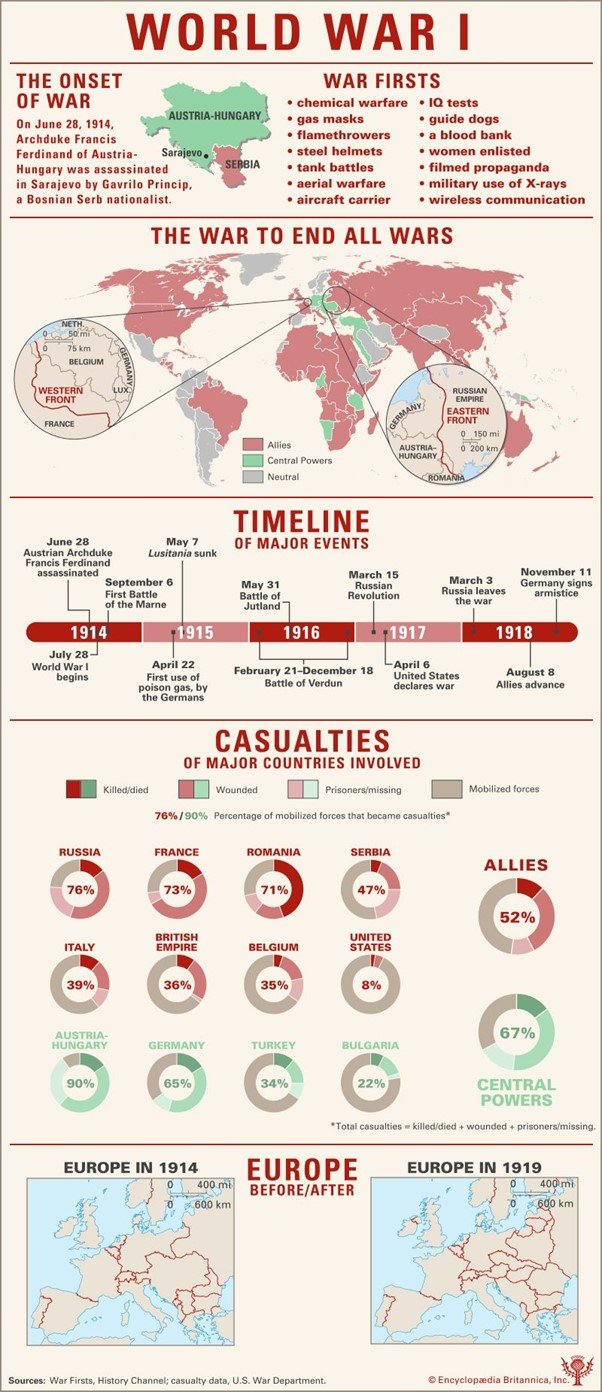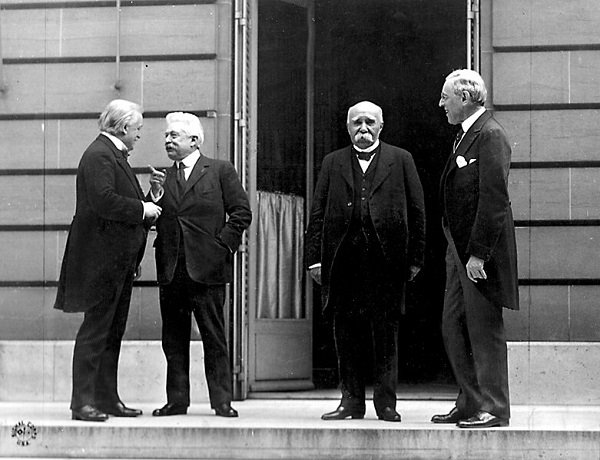History - 28 June And The Events That Bookended World War 1
‘Forward! Forward to Victory’ poster by Lucy Kemp-Welch
On the 28th of June 1914, Archduke Franz Ferdinand and his wife, Sophie Chotek von Chotkova, were assassinated in Sarajevo by Gavrilo Princip, a Bosnian Serb.
The assassination of the heir to the Austro-Hungarian throne worsened the already rising diplomatic tensions between the great powers in Europe.
‘Domenica del Corriere’, an Italian paper, with a drawing by Achille Beltrame depicting the assassination of Franz Ferdinand and Sophie (W.Commons)
Austria-Hungary and Germany advised Serbia to open an investigation, which led to angry exchanges between the parties.
After receiving assurances that Germany would honour its military alliance, Austria-Hungary then issued a formal letter to the Serbian government on the 23rd of July 1914 detailing specific demands that Serbia should accept, including allowing Austro-Hungarian officials to be part of the inquiry into the assassination plot.
Serbia, having received a telegram of support from Russia, mobilized its army and responded to the letter partially accepting some of the demands but rejecting others.
Austria-Hungary reacted by breaking diplomatic relations.
The following day, Serbian reservists crossed the Danube river onto the Austro-Hungarian side, and Austro-Hungarian soldiers fired into the air to warn them off.
On the 28th of July 1914, Austria-Hungary declared war and mobilised a portion of its army, which led to Russia and France mobilising their armies to honour the terms of their Secret Treaty of 1892.
According to that treaty, if any of the Triple Alliance, which consisted of Austria-Hungary, Germany and Italy, mobilised, Russia and France were obliged to follow suit.
On the 31st of July, the Russian government were given 12 hours to “cease all war measures against Germany and Austria-Hungary” (‘The Month that Changed the World: July 1914’ – Gordon Martel)
Although France had ordered mobilisation, it had yet to declare war.
Despite not making any formal mention of war, Britain had already committed to support France with the Royal Navy having mobilised and public opinion strongly in the government’s favour.
On the 31st of July, Britain requested Germany and France to respect Belgian neutrality, which France pledged to do, but Germany did not reply; Belgium’s independence and neutrality had been recognised and guaranteed in the 1839 Treaty of London.
On the morning of the 1st of August, Germany’s ultimatum to Russia expired, and both countries were at war.
On the 2nd of August, Germany occupied Luxembourg.
On the 3rd of August, Germany declared war on France, and demanded free passage through Belgium, which was refused.
On the 4th of August, Germany invaded Belgium, and King Albert I of Belgium requested help under the Treaty of London.
Britain demanded Germany withdraw from Belgium, and when the ultimatum expired with no response, Germany was then also at war with Britain.
On the 29th of October 1914, the Ottoman Empire launched the Black Sea Raid against Russian ports, leading Russia to declare war on the Ottoman Empire on the 2nd of November.
Britain and France then declared war on the Ottoman Empire on the 5th of November.
WW1 was fought throughout Europe, the Middle East, Africa, the Pacific, and parts of Asia.
It wasn’t until April 1917 that the United States entered the war.
Later that same year, in October, the Bolsheviks seized power in Russia and made peace with the Central Powers in 1918.
No longer needing to fight Russia, Germany concentrated their efforts in the west, hoping to win a decisive victory before the arrival of significant numbers of American troops.
But the offensive failed, and the German Army, exhausted and demoralised, was unable to stop the Allies advancing in August 1918.
Between the 29th of September and the 3rd of November 1918, Bulgaria, the Ottoman Empire, and Austria-Hungary agreed to armistices.
Isolated, facing revolution in Germany, and with the army close to mutiny, Kaiser Wilhelm II abdicated on the 9th of November.
The Armistice of the 11th of November 1918 signalled an end to the fighting.
It’s estimated that around 9 million soldiers died in combat, with about 23 million wounded.
The estimated 5 million civilian deaths were caused by military action, hunger, and disease, with millions more dying because of genocide.
Significant facts about WW1 (Britannica)
In 1919 and 1920, the Paris Peace Conference, the formal meeting of the victorious Allies, set the peace terms for the defeated Central Powers.
The Conference was dominated by the leaders of Britain, France, the United States, and Italy, and resulted in 5 treaties that rearranged the maps of Europe and parts of Asia, Africa, and the Pacific Islands, and imposed financial penalties.
Council of Four at the Paris peace conference, 27th of May 1919 – (L-R) PM David Lloyd George (GB), PM Vittorio Orlando (Italy), Premier Georges Clemenceau (France), President Woodrow Wilson (USA) – photo by Edward N. Jackson, US Army Signal Corps (W.Commons)
The empires of Russia, Germany, Austria-Hungary, and the Ottoman Empire were dismantled, leading to the creation of new independent states including Poland, Czechoslovakia, and Yugoslavia.
Germany and the other losing nations were not allowed to participate in the deliberations, and this resulted in political resentments, which would have dire consequences.
The most important treaty of WW1 was the Treaty of Versailles, which was signed between Germany and most of the Allied Powers, but not the United States which signed a separate treaty with Germany.
Treaty of Versailles, English version (W.Commons)
The other defeated Central Powers signed separate treaties.
Article 231 of the treaty, also known as the War Guilt clause, was the most critical and controversial.
It stated:
‘The Allied and Associated Governments affirm and Germany accepts the responsibility of Germany and her allies for causing all the loss and damage to which the Allied and Associated Governments and their nationals have been subjected as a consequence of the war imposed upon them by the aggression of Germany and her allies.’
The other Central Powers signed treaties with similar articles.
Germany was required to disarm, make ample territorial concessions, and pay reparations to certain countries.
In 1921, the total cost of these reparations was assessed at 132 billion gold marks, or about £6.6 billion, which, in 2023, is roughly equivalent to £284 billion.
Many economists, including John Maynard Keynes, said the terms were too harsh, that the reparations were excessive.
But others, like French Marshal Ferdinand Foch, believed it to be too lenient.
When Germany, which hadn’t been allowed to participate in any of the discussions, didn’t sign the treaty straight away, the Allies declared that war would resume.
The German government, headed by Philipp Scheidemann, couldn’t agree on a common position, and Scheidemann resigned as he refused to sign the treaty.
The new head, Gustav Bauer, agreed to sign if certain articles were withdrawn, including Article 231.
The Allies’ response was to issue an ultimatum demanding Germany accept the treaty as it stood or face an invasion within 24 hours.
On the 23rd of June, Bauer relented and confirmed the treaty would be signed.
On the 28th of June 1919, the Treaty of Versailles was signed at the Palace of Versailles.
Signing of Peace in the Hall of Mirrors, Versailles 1919 - William Orpen (W.Commons)
In foreground - Dr. Johannes Bell (seated), and Herr Hermann Múller, the German representatives.
Facing them - other heads of state including Woodrow Wilson, Georges Clemenceau and David Lloyd George (5th, 6th & 7th from left)
The crippling war debts borne by Germany and Austria led to hyperinflation in both countries, which resulted in economic collapse.
The bitter resentment that followed led to the rise of the Nazi Party, and eventually to the Second World War in September 1939, only 20 years after the signing of the Treaty of Versailles.





